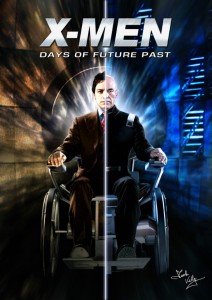 The real paradox of X-Men: Days of Future Past is not a temporal one. Rather it lies in the painful relationship between History and stories, mutually incompatible.
The real paradox of X-Men: Days of Future Past is not a temporal one. Rather it lies in the painful relationship between History and stories, mutually incompatible.
The first, fixed and immutable, stays at the back of the viewer (and of the author as well), it’s closed and it reveals itself as a disturbing shadow which we always have to confront.
The second, playful variants of more or less ancient myths, are free to move in all possible directions, bound only by the constraint of maintaining a logical causality.
History and stories come together all along Singer’s poetical world. It seems that the second can’t really exist without the dark roots of the first that hangs over from above like a granite boulder.
And the time machine – that is the subterranean deus ex machina of the whole story – makes us able to settle the score with the stories, but can do nothing against the tragic fixity of the Facts recorded in the annals.
So stories can toy, for example, with the idea of suggesting that Kennedy was a mutant and Magneto, as a good master of metals, being on the crime scene, diverted the fatal bullet, but this idea that acts precisely in the world of storytelling, does not erase anything of the death of the American president, nor ever could.
Moreover, the time machine is used here to correct the events of the story in one of the most daring and successful operations of retconning ever, but do not take the same liberty with History. We are not in the same territories of Inglourious Basterds where Cinema is strong enough to take the luxury to kill Hitler in a pyre of silver nitrate. In Singer’s movies, rather, the post-modern model – standing in front of the gates of the concentration camps that, according to Adorno, had killed any possible future form of poetry – is forced to stand in front of the immutability of History itself. Just like for the protagonist of Valkyrie, who plots to kill Hitler and his story is like a butterfly trapped in the bell jar of the immutability of his defeat.
So there! Probably the most intriguing metaphor in all of Singer’s work is this inexhaustible flapping on the glass, this continued death of moths on the fire of tragedies so close to us that still burn. Not only the Shoah, mind you, because the X-Men are here confronted with the horror of the Cold War, with the missile crisis, with the fear of atomic bomb and, now, with Vietnam and the Kennedy assassination (to be honest here only told in words).
You can understand the size of Singer’s characters only after the end, and this tastes like Greek Tragedy. Facts lead stories to a finale that the viewer already knows, but heroes can’t help but keep charging on their mission even if they sense it is suicide.
And now that time travel enters heavily in the plan of the story, this painful friction between the reasons of the imagination and the knowledge that what is done is done, becomes even more poetically self aware.
X-Men: Days of Future Past probably is not the best of Singer’s movie, nor probably it is the most beautiful of the three episodes of the series that he shot (I personally prefer the second, more delicate on the theme of adolescence and diversity) however, it is the one that better defines the terms of a reflection on both the past and the plausible fantastic.
It is a work far different from traditional Cinecomics (and it will be little loved by fans of the original comic for this reason) and this is because of its ability to stay in the times of its characters where the need to chase the twists of the plot does not preclude attention to detail. And so often the action is discontinued to make room for the secret tragedy of each character or it allows for long parentheses of plain surrealism as in the scene where Quicksilver, quickly resolves the firefight between mutants and police.
Quicksilver! Perhaps the character who best embodies the overall sense of the development of the plot, with its sudden accelerations and decelerations, with its ability to play with the speed of the clock that – and there’s the rub though – can always and only go forward.
